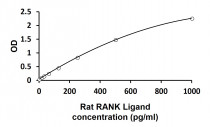ARG81958
Rat sRANK Ligand / TNFSF11 / TRANCE ELISA Kit
Rat sRANK Ligand / TNFSF11 / TRANCE ELISA Kit for ELISA and Rat
Component
| Cat No | Component Name | Package | Temp |
|---|---|---|---|
| ARG81958-001 | Antibody-coated microplate | 8 X 12 strips | 4°C. Unused strips should be sealed tightly in the air-tight pouch. |
| ARG81958-002 | Standard | 2 X 10 ng/vial | 4°C |
| ARG81958-003 | Standard/Sample diluent | 30 ml (Ready to use) | 4°C |
| ARG81958-004 | Antibody conjugate concentrate (100X) | 1 vial (100 µl) | 4°C |
| ARG81958-005 | Antibody diluent buffer | 12 ml (Ready to use) | 4°C |
| ARG81958-006 | HRP-Streptavidin concentrate (100X) | 1 vial (100 µl) | 4°C |
| ARG81958-007 | HRP-Streptavidin diluent buffer | 12 ml (Ready to use) | 4°C |
| ARG81958-008 | 25X Wash buffer | 20 ml | 4°C |
| ARG81958-009 | TMB substrate | 10 ml (Ready to use) | 4°C (Protect from light) |
| ARG81958-010 | STOP solution | 10 ml (Ready to use) | 4°C |
| ARG81958-011 | Plate sealer | 4 strips | Room temperature |
Overview
| Product Description | ARG81958 Rat sRANK Ligand / TNFSF11 / TRANCE ELISA Kit is an Enzyme Immunoassay kit for the quantification of Rat sRANK Ligand / TNFSF11 / TRANCE in serum, plasma (heparin, EDTA) and cell culture supernatants. |
|---|---|
| Tested Reactivity | Rat |
| Tested Application | ELISA |
| Specificity | There is no detectable cross-reactivity with other relevant proteins. |
| Target Name | sRANK Ligand / TNFSF11 / TRANCE |
| Conjugation | HRP |
| Conjugation Note | Substrate: TMB and read at 450 nm. |
| Sensitivity | 7.8 pg/ml |
| Sample Type | Serum, plasma (heparin, EDTA) and cell culture supernatants. |
| Standard Range | 15.6 - 1000 pg/ml |
| Sample Volume | 100 µl |
| Precision | Intra-Assay CV: 5.5%; Inter-Assay CV: 7.2% |
| Alternate Names | TRANCE; Osteoprotegerin ligand; CD254; sOdf; Receptor activator of nuclear factor kappa-B ligand; OPTB2; RANKL; OPGL; Tumor necrosis factor ligand superfamily member 11; hRANKL2; TNF-related activation-induced cytokine; Osteoclast differentiation factor; ODF; CD antigen CD254 |
Application Instructions
| Assay Time | ~ 5 hours |
|---|
Properties
| Form | 96 well |
|---|---|
| Storage Instruction | Store the kit at 2-8°C. Keep microplate wells sealed in a dry bag with desiccants. Do not expose test reagents to heat, sun or strong light during storage and usage. Please refer to the product user manual for detail temperatures of the components. |
| Note | For laboratory research only, not for drug, diagnostic or other use. |
Bioinformation
| Database Links |
Swiss-port # Q9ESE2 Rat Tumor necrosis factor ligand superfamily member 11 |
|---|---|
| Gene Symbol | TNFSF11 |
| Gene Full Name | tumor necrosis factor (ligand) superfamily, member 11 |
| Background | This gene encodes a member of the tumor necrosis factor (TNF) cytokine family which is a ligand for osteoprotegerin and functions as a key factor for osteoclast differentiation and activation. This protein was shown to be a dentritic cell survival factor and is involved in the regulation of T cell-dependent immune response. T cell activation was reported to induce expression of this gene and lead to an increase of osteoclastogenesis and bone loss. This protein was shown to activate antiapoptotic kinase AKT/PKB through a signaling complex involving SRC kinase and tumor necrosis factor receptor-associated factor (TRAF) 6, which indicated this protein may have a role in the regulation of cell apoptosis. Targeted disruption of the related gene in mice led to severe osteopetrosis and a lack of osteoclasts. The deficient mice exhibited defects in early differentiation of T and B lymphocytes, and failed to form lobulo-alveolar mammary structures during pregnancy. Two alternatively spliced transcript variants have been found. [provided by RefSeq, Jul 2008] |
| Function | Cytokine that binds to TNFRSF11B/OPG and to TNFRSF11A/RANK. Osteoclast differentiation and activation factor. Augments the ability of dendritic cells to stimulate naive T-cell proliferation. May be an important regulator of interactions between T-cells and dendritic cells and may play a role in the regulation of the T-cell-dependent immune response. May also play an important role in enhanced bone-resorption in humoral hypercalcemia of malignancy. [UniProt] |
| Highlight | Related products: TNFSF11 antibodies; TNFSF11 ELISA Kits; Related news: Detecting MMPs and their non-ECM substrates New ELISA data calculation tool: Simplify the ELISA analysis by GainData |
| PTM | The soluble form of isoform 1 derives from the membrane form by proteolytic processing (By similarity). The cleavage may be catalyzed by ADAM17. [UniProt] |
Images (1) Click the Picture to Zoom In
Specific References
| Title | Download Link |
|---|---|
| ARG81958 Rat sRANK Ligand / TNFSF11 / TRANCE ELISA Kit User's manual |
 Download Download
|








